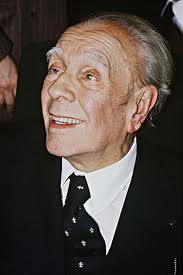By Umapagan Ampikaipakan | interesting.times@mac.com
 JORGE Luis Borges once wrote that there was no end to the illusions of patriotism. In an essay he called Our Poor Individualism, published in 1946, Borges began with the following lesson: “In the first century of our era, Plutarch mocked those who declared that the Athenian moon is better than the Corinthian moon; Milton, in the 17th, observed that God is in the habit of revealing Himself first to His Englishmen; Fichte, at the beginning of the 19th, declared that to have character and to be German are obviously one and the same thing.”
JORGE Luis Borges once wrote that there was no end to the illusions of patriotism. In an essay he called Our Poor Individualism, published in 1946, Borges began with the following lesson: “In the first century of our era, Plutarch mocked those who declared that the Athenian moon is better than the Corinthian moon; Milton, in the 17th, observed that God is in the habit of revealing Himself first to His Englishmen; Fichte, at the beginning of the 19th, declared that to have character and to be German are obviously one and the same thing.”
Religion and patriotism are often irreconcilable with freedom. They are both concepts constrained by definition. They require unflinching conviction. They do not allow for any sort of lapse — neither in judgment nor in belief. They function on an assumed superiority, on the fervent faith that their way isn’t just the right way, but also the only way. They are constantly facing down the fear of rising new influences that threaten to undermine their credibility and their role in society.
It is what it is. And to expect anything else would be naive. Doctrine, after all, demands a certain doggedness. It requires inflexibility. It makes no room for compromise. It just would not work if it did. Not practically. Not definitionally.
Now, there is no extricating religion from our politics. The vast majority of us are deeply religious. It is our way of life. It is something so entrenched into our everyday, into our culture, and even into our language. It is so much a part of who we are and how we identify ourselves that any politics would be remiss to not address it. The separation of mosque (of church, of temple) and state is simply not possible. Why? Because it just isn’t what the majority of our citizenry want.
Over the past few weeks, we seem to have experienced a sort of stalemate with regards to our discourse on religion and its role in our society. From (Parti Keadilan Rakyat Vice-President-right) Nurul Izzah Anwar’s statement on freedom of religion, to those Kelantan bylaws restricting what hairdressers can and cannot do, to the constant evocation of God in our politics, there has been no shortage of fodder for our conversation.
our discourse on religion and its role in our society. From (Parti Keadilan Rakyat Vice-President-right) Nurul Izzah Anwar’s statement on freedom of religion, to those Kelantan bylaws restricting what hairdressers can and cannot do, to the constant evocation of God in our politics, there has been no shortage of fodder for our conversation.
 our discourse on religion and its role in our society. From (Parti Keadilan Rakyat Vice-President-right) Nurul Izzah Anwar’s statement on freedom of religion, to those Kelantan bylaws restricting what hairdressers can and cannot do, to the constant evocation of God in our politics, there has been no shortage of fodder for our conversation.
our discourse on religion and its role in our society. From (Parti Keadilan Rakyat Vice-President-right) Nurul Izzah Anwar’s statement on freedom of religion, to those Kelantan bylaws restricting what hairdressers can and cannot do, to the constant evocation of God in our politics, there has been no shortage of fodder for our conversation.
The sad state of our affairs, however, is that we are doing little to engage in this conversation. There has been plenty of chatter and far too much noise. And most of it has been about what can and cannot be said rather than an actual debate about what was said. There have been reprimands and recriminations but little to no communication. The unfortunate consequence of which is that it seems to push us further into our respective racial and religious silos. Malay, Chinese, Indian. Muslim, Christian, Hindu. Rendering us separate. Individual. Disparate rather than distinct. Divergent rather than diverse.
Our individuality has always been a source of strength. Our recent individualism, on the other hand, is cause for concern. You look after your God and I’ll look after mine. Don’t bother yourself with my problems, just worry about your own.
There seems to be a growing isolationism among us. This misplaced belief that we can somehow function as a nation if we just mind our own business and not involve ourselves in that of our neighbours. But that’s just not how society works.
Living together means learning how to live together. Any decent society must generate a feeling of community. Community offsets loneliness. It gives people a vitally necessary sense of belonging. My neighbour’s problems are my own. There is no escaping it. And trying to just risks a communalism that is altogether dangerous.
 We need to talk and we need to talk often. There needs to be a vibrant conversation about our obligations to ourselves and to one another, about the links that we need to create to support each other.
We need to talk and we need to talk often. There needs to be a vibrant conversation about our obligations to ourselves and to one another, about the links that we need to create to support each other.
In a fitting analogy, clergyman Henry Ward Beecher drew his divine inspiration from the forest when he said “God designed men to grow as trees grow in open pastures, full-boughed all around; but men in society grow like trees in forests, tall and spindling, the lower ones overshadowed by the higher, with only a little branching, and that at the top. They borrow of each other the power to stand; and if the forest be cleared, and one be left alone, the first wind which comes uproots it”. - nst.com.my



No comments:
Post a Comment
Note: Only a member of this blog may post a comment.